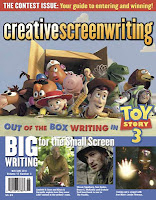Sorry this is a bit late. Apartment-and-cat-sitting and I’m losing a lot of time driving back and forth.
If you’ve been on the internet lately, especially to any writing-related sites, you’ve probably noticed a lot of what I like to think of as film-school mentality. It applies to books just as much as movies, but I think it’s a mindset that really began with the spec script boom of the late eighties and early nineties. The people who display this mentality toss around a lot guru-istic terms and can give you long, exacting lists of
why your story doesn’t work, and they make it sound like they really know what they’re talking about.
Now, I’ve talked a few times (although
none recently) about criticism. A good critic of my work is someone who’s going to be honest about what works and what doesn’t. Someone who just says “this sucks” isn’t helping me in the slightest. They’re also going to be able to explain why those elements do or don’t work. But not all of these reasons are going to hold, because sometimes they’re based on a faulty premise.
Which brings us to reverse-engineering.
Reverse engineering is when you study how a piece of technology is built, work backwards to its initial phases, then work forward in creating your own.
For example, let’s say a UFO crashed in New Mexico back in the ‘50s. My crack team studies its propulsion system, figures out it works off some kind of magnetic drive, and then eventually figures out how to build their own magnetic drives for monorails and Mk VII Space Shuttles (shhhh, no one’s supposed to know about those). That’s reverse engineering.
It can also be something mundane. I can buy a toy like Grimlock the Dinobot, take him apart, and isolate all the individual components. Then I just recast those parts, reassemble them, and look at that—I’m making transforming robot dinosaurs that look and work just like the one I studied.
Now you’ll notice I used two different machines in my examples. One’s alien-level tech and the other’s a fairly complicated toy, but they’re both mechanical. There’s a reason for that. Reverse-engineering is a very mechanical process. It relies very heavily on the fact that these processes work the same in each direction. A to B to C, C to B to A, and then A back to B back to C. I can’t take Grimlock apart, put the components back together again, and somehow end up with a Barbie doll.
However…
This isn’t true of stories. Stories are much more organic. They depend on a high degree
of empathy between the writer and the reader. The elements of a story can go together many different ways, with many different results. Sometimes, a story just works and no one can tell you why.
Y’see, Timmy, unlike Grimlock, there’s lots of ways the individual elements of a story can go back together again. Grimlock’s parts will make a robot dinosaur every time you assemble them, but story elements are fluid and mutable. They can interact in different ways. That’s why I can combine a lot of the same characters, plot points, and themes to get a series of radically different stories. The Forgotten Door. E.T. Escape to Witch Mountain. Starman. Brother From Another Planet. They’re all the same pile of story elements, but these are all very, very different stories.
Think of it this way… let’s fall back on cooking as a parallel (as I have
once or thrice before). I want to reverse-engineer some waffles. So if I break the waffles down I’ll find flour, sugar, milk, eggs, and some heat binding them together. Maybe some chocolate chips, too. But those ingredients could combine to make more than just waffles. I could take those same ingredients and make pancakes. Or muffins. Or cookies.
More to the point, these ingredients can also make lukewarm gruel. Something watery and maybe even a bit slimy that will make you gag. Just because they went together one way and worked, or even three ways, doesn’t mean we can make a hard fast rule that says all good things to eat have flour, sugar, and eggs in them. Or that anything with flour, sugar, and eggs in it is good to eat.
This is why I’m against most gurus and how-to writing books. You can’t come up with solid rules for how to write a story by reversing the way you analyze them. Using story A to critique story B may work in a classroom, but it won’t work when I try to write a story. Because we’re all writing different stories and we’re all writing them
in our own way for our own chosen audience. Just because a set of rules can be applied to a novel like
To Kill A Mockingbird doesn’t mean a book like
Carrie or
A Princess of Mars is wrong for not following them.
I’m sure most of us know someone (or several someones) who’s written a novel, screenplay, or maybe even just a short story that follows all the rules and tips from some guru or how-to writing book. And these stories tend to be… well, kind of blah. They’re acceptable stories, they’re just kind of mechanical. And that’s because these stories weren’t written, they were manufactured.
Writing just doesn’t work that way. Analyzing stories does, but analyzing is not the same as writing. Just because I know how to do one doesn’t mean I know how to do the other.
This is why I’m always a little leery when people begin to dissect and critique a story using terms like “turning points” and “redemptive moments” and “inciting incidents,” usually while giving hard page counts for when all these things
musthappen in a story. These are all guru terms that try to pin down very vague, general things that
change from story to story. The more specific those terms are, the less accurate and useful they tend to be, and when people insist on following these inaccurate rules to the letter… well, nothing good comes of it.
Now, I’m not saying there’s nothing to be learned
from studying stories or films. That’d just be silly. But I need to understand the difference between a set of general guidelines and a hard-fast formula. I’m sorry to sound repetitive, but there is no formula for writing a good story. None.
Bruce Joel Rubin, the Oscar-winning screenwriter of
Ghost (and also
Deadly Friend) made
the keen observation a while back that we experience stories through our gut. That’s where every good story hits us, on one level or another. Stories that go through our heads never work, because the minute we start analyzing we’re no longer immersed in the story.
This works going both ways. When I write a story, it needs to come from my gut. It’s not meticulous or precise, it’s raw and emotional and often more organic than logical. This is why stories that get written to a made-up formula—stories that come out of someone’s head—end up feeling like… well, the product of a formula.
Next time… well, next time I want to talk about something I couldn’t care less about.
Until then, put down the how-to books and go write.
.jpg) The idea of the muse has been pulled from mythology and perpetuated by modern writing classes and gurus to excuse lazy behavior. It’s an artistic, pseudo-intellectual scapegoat. People who don’t feel like writing, who don’t feel like solving problems, they blame the muse.
The idea of the muse has been pulled from mythology and perpetuated by modern writing classes and gurus to excuse lazy behavior. It’s an artistic, pseudo-intellectual scapegoat. People who don’t feel like writing, who don’t feel like solving problems, they blame the muse. 



